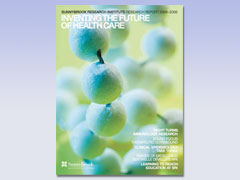Clinical Epidemiology: Take Three - Redelmeier
Don Redelmeier's understanding of this way of thinking smacks of some dissatisfaction. "There really are many things wrong with current health care, and we want future health care to be better" says the senior scientist, who holds a Canada Research Chair in Medical Decision Sciences and is cross-appointed to the Institute for Clinical Evaluative Sciences (ICES).
But Redelmeier, whom SRI senior scientist and colleague Michael Schull describes as "one of the few people who can manage to create broad interest in his research," is not about to let the flaws go untreated. "The mission statement around here," he says, "is to make health care in the future better than it is today."
Examples of this early declaration in action are legion. Among the more recent is his research on the connection between statins and sepsis.
In general, people with hardening of the arteries take a statin, a drug that lowers fat levels in the blood, to reduce their cholesterol. A possible underlying predisposition to sepsis is not a consideration in its prescription. Similarly, the risk of contracting sepsis has nothing to do with cholesterol count. Sepsis, a rare but serious bacterial infection, visits its victims in response to other factors, like if they have cancer, compromised immune systems or just have lousy luck, and develop pneumonia or a kidney infection.
Jumping to preclinical models from experiments outside of the clinical epidemiology realm, in the literature, Redelmeier noted that pretreatment with statins extends survival and sometimes even promotes complete recovery from blood-poisoning sepsis.
He extended this research to people, considering 60,000 Ontarians with hardening of the arteries, some of whom were taking a statin, some of whom were not. Taking care to peer-match them in terms of other risk factors, Redelmeier followed-up these people—a mean age of 74, 56% men, 16% living in rural Ontario—for a median duration of five years between 1997 and 2002. Findings, published in The Lancet in 2006, were revealing. He observed that those who were taking statins had a 20% lower risk of developing or dying from sepsis than those who were not.
"That's a big deal," he says, closing his eyes for emphasis, leaning his long body back in his chair, "because sepsis can be a very unpleasant disease: lethal (the case fatality rate of sepsis is at least 20%) and expensive to treat." What's more, he notes that current clinical treatment for sepsis is "not always satisfactory." Statins, he concluded, might prove a feasible method for preventing at least some cases.
That his work revealed a new use for drugs whose relevance was previously assigned to another application cements Redelmeier's conviction that research of medications that are now being used more broadly under normal community circumstances, might reveal characteristics—surprising harms or benefits—that weren't anticipated. This impulse makes sense to Schull, who calls Redelmeier "a very serious guy superficially," but says, "deep down, Don and his research are like a kid in an amusement park: He sees all this opportunity to go on the rides."
Redelmeier's research was funded by the Canada Research Chairs Program, Canadian Institutes of Health Research, National Institutes of Health (U.S.) and Physicians' Services Incorporated Foundation.
- Read the rest of Clinical Epidemiology: Take Three






